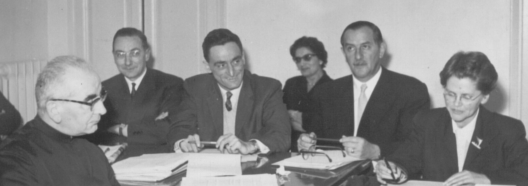Claude Ryan: A Short Biography
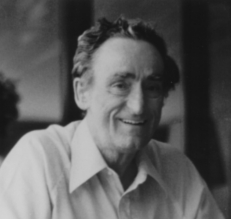
By Robert Joseph Di Pede and Daniel Cere
Contents
1.
The Early Years
2.
Catholic Action
3.
Journalism
4.
Politics
5.
The Newman Centre and Catholic Studies at McGill University
6.
Select publications by Claude Ryan
7.
Select Awards and Honours
8.
Select Online Texts by Claude Ryan
The Early Years
Claude Ryan was born in Montreal on January 26th 1925 to Henri-Albert Ryan and Blandine Dorion. He was the younger brother of Gérald Ryan (d. 2002) and the older brother of Yves Ryan (d. 2014). As a single mother living through the Great Depression, Blandine was faced with the hardship of raising three children in impoverished conditions. Despite this formidable obstacle, she managed to secure a first-rate education for her three sons, putting them on paths to prestigious careers in law, politics, and journalism. Claude received his early education at Saint-Jean-de Matha in Ville-Émard, after which he went on to le Collège Sainte-Croix (later renamed Collège Maisonneuve), where from 1937 to 1944, under the priests of the Congregation of the Holy Cross, he received a thorough grounding in Greco-Roman classics. In 1944, at the age of 19, Ryan entered the School of Social Service at l’Université de Montréal, where he pursued a programme of studies in Social Work until 1946.
Catholic Action
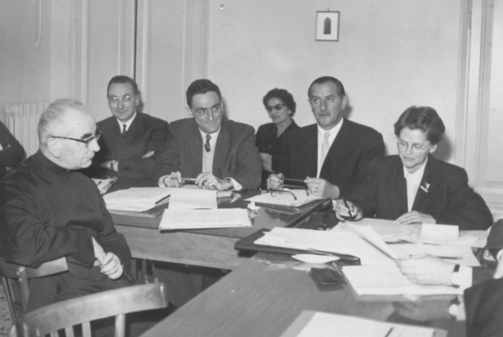
During his university years, Ryan became involved with Catholic Action. Hugely popular and influential in many Catholic countries around the world at the time, Catholic Action movements were associations of lay men and women who endeavoured to receive an integral moral and religious formation in the Catholic tradition in order to foster the living presence of the Catholic faith at all levels of life and action – political, economic, and social.
Ryan’s involvement with Catholic Action developed over the years and became one of the most formative experiences of his life. While attending l’Université de Montréal from 1944 to 1946, at the mere age of 20, Ryan was elected to the post of Secrétaire national de la section de langue française of Canadian Catholic Action. In 1950 he published his first major essay Les classes moyennes au Canada français , bringing key perspectives of Catholic social teaching to bear on social and political realities of Quebec at the time. From 1951 to 1952, Ryan undertook a course of studies at the Pontifical Gregorian University in Rome on church history and world history – interests that would remain with him throughout his entire life.
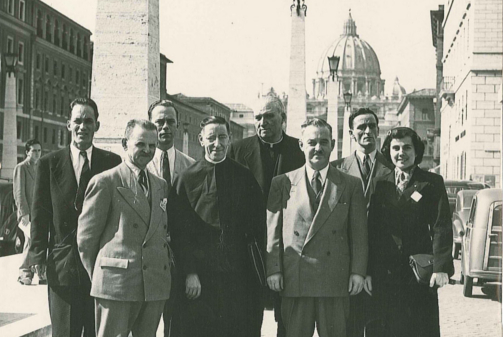
When Ryan returned to Quebec, he resumed his leadership of Catholic Action and worked from an office at the Archdiocese of Montreal adjacent to the Cardinal’s office. The close physical proximity to the Cardinal’s office symbolized the intimate working relationship between Ryan and Montreal’s Cardinal Archbishop Paul-Émile Léger (1950–1968). Ryan was at the centre of Montreal’s highly influential ecclesiastical headquarters at a time when key lay and religious leaders were actively fostering the social and political ferment that would bear fruit in Quebec’s Quiet Revolution. In these years, Ryan also met Madeleine Guay, a colleague from Catholic Action, with whom he fell in love. Ryan married Madeleine in 1958 at the church of Saint-Louis-de-France.
As the Second Vatican Council opened in 1962, Ryan’s attention shifted from Montreal to Rome. Vatican II represented the Church’s first large-scale coordinated effort to examine its relationship to the modern world. Montreal’s Le Devoir commissioned Ryan to cover this momentous event for its readers. On October 12 th 1962, his first article on Vatican II appeared: The Pope Inaugurates ‘Vatican II.’ First Goal of the Council: The Unity of the Human Race .
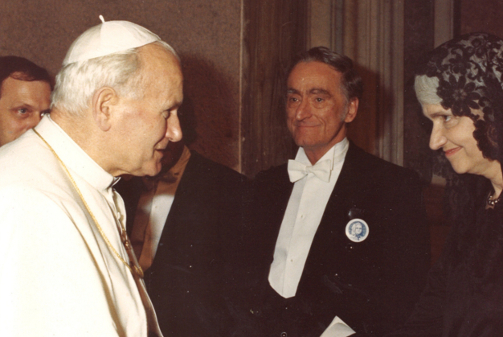
In the same year, Ryan was appointed President of the special committee on adult education for the Ministry of Education of Quebec, which would retain its association with the Catholic Church for only two more years. The appointment built on Ryan’s brand of Catholic Action, which was marked by a keen interest in adult education; his views of the subject had already been explored to some extent in his published study, L’éducation des adultes, réalité moderne (1957). He would return to education later in life both from a policy perspective as an elected representative of the Quebec National Assembly and as an educator at McGill University.
As Ryan moved on to these new areas of responsibility by the late 1960s, his seventeen years of service in the administration of Catholic Action were drawing to a close. Towards the end of his life Ryan acknowledged the enduring impact of Catholic Action on his own personal and professional formation, including his approach to journalism, public life and liberal democratic politics. His approach to shaping public policy and political decision-making remained consistent with the basic method of Catholic Action: “observe-judge-act” – a phrase he often cited.
Journalism
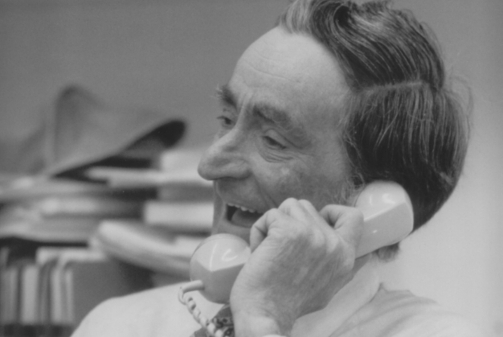
Ryan quickly established a reputation as a rising journalist, displaying competence, integrity, and élan. The diversification of his interests beyond strictly ecclesial concerns was no doubt spurred by his involvement in other areas of civil society, such as his tenure on the Board of Governors of the Caisse populaire Saint-Louis-de-France from 1956 to 1968, of which he was Vice President from 1963 to 1968.
In 1964, Ryan was appointed to a daunting array of executive positions including Director of Le Devoir, General Manager of l'Imprimerie populaire limitée , and member of the Governing Board of La Presse . As Ryan embraced these new responsibilities, he brought with him a socially progressive approach to liberal democracy which had been shaped by his appropriation of Catholic social teaching.
The awards and honours Ryan received at this relatively early juncture of his life reflect both his exceptional talent as a journalist and editor, as well as the influence of his socially-progressive form of Catholicism. Among early recognitions, Ryan received the National Newspaper Award (1964), the National Press Club Prize (1965), a nomination to the Canadian News Hall of Fame (1968), as well as recognition for his contributions to interfaith and human rights issues, such as the Human Relations Award of the Canadian Council of Christians and Jews (1966) and a certificate of recognition on behalf of Canadian Jewish workers for his defence of human rights (1969).
During the 1960s Ryan directed his attention to the major challenges that Quebec was facing during this period of intense social and political ferment. He found himself immersed in nationalist and constitutional debates focussed on questions of cultural identity, the protection and development of the French language, and Quebec sovereignty. The October Crisis of 1970 was a traumatic moment for Quebec political culture and posed serious challenges to Ryan as one of Quebec’s leading public intellectuals. His book, Le Devoir et la crise d'octobre 70 , published one year after the Crisis, explored the question of journalistic integrity in the context of a liberal democracy under the general conditions civil unrest. Looking back on his years at Le Devoir before his death in 2004, Ryan wrote: “At Le Devoir I learned to grasp the deep roots of our people's attachment to preserving their identity.”
Politics
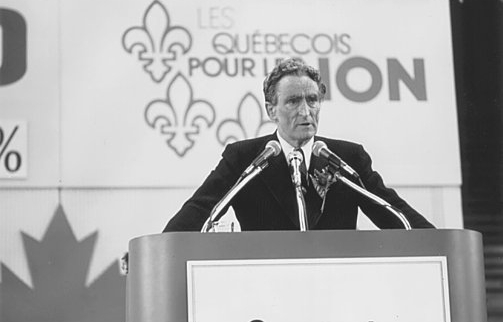
The Parti Québécois came to power in 1976 and Ryan was slowly drawn into the political arena.
According to Ryan, political office was not something to which he aspired; it was rather something into which he was drawn by circumstances and as necessity required. His election as Leader of the Quebec Liberal Party in 1978 was followed by four consecutive terms as a Member of the National Assembly from 1979 to 1993. Ryan served as leader of the official opposition from 1979 to 1982, during which he victoriously championed the “No” vote in the 1980 Quebec Referendum on the question of Quebec sovereignty. During this critical period, Ryan worked closely with his wife, Madeleine, who also played a crucial role in advancing the “No” campaign. Madeleine’s untimely death in 1985 brought great sorrow to Ryan and their five children. Nevertheless, with Robert Bourassa as the new Premiere (elected December 1985), Ryan was propelled into a number of major political roles including: Minster of Education, Minister of Public Security, Minister of Municipal Affairs, and Minister in charge of applying the French Language Charter.
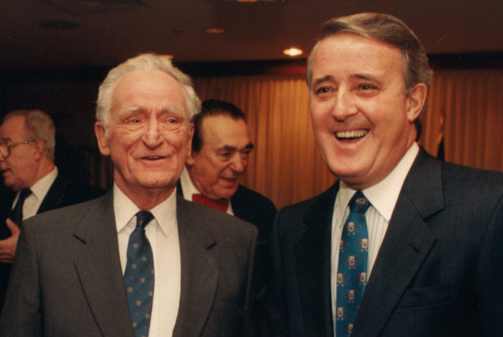
Throughout his political career, Ryan endeavoured to help define Quebec’s place in Canada’s federalist system. When he retired from active political office, he published a landmark essay, Regards sur le fédéralisme (1995), in which he reiterated that Canadian federalism seemed to offer the best framework for the pursuit of liberty and mutual respect, without which key characteristics of Canada, such as bilingualism and cultural diversity, could not prosper. In the same year, Ryan was inducted into the Order of Canada as a Companion, its highest and most prestigious rank.
Claude Ryan’s disciplined work ethos as a public intellectual and educator would continue unabated during his retirement. Through articles, essays, interviews, and public lectures, he remained an influential voice on matters of public concern. His activities in these latter years reflected a broad spectrum of interests, from the religious to the civic, such as his work for the Montreal-based Catholic radio station Radio Ville-Marie (founded in 1995) and his service on the Quebec Council of Recreation ( Conseil québécois du loisir ).
The Newman Centre and Catholic Studies at McGill University
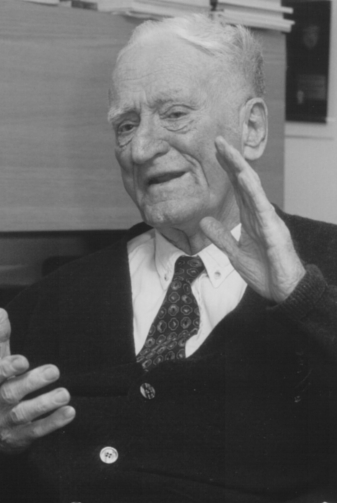
Social Thought at McGill University.
In the final decade of his life, Ryan spoke more explicitly about the role and importance of faith in his personal formation and its salience in the public forum. Following an invitation by the Newman Centre of McGill University in 1997 to give a public lecture on The Legacy of John Henry Newman for our Secular Age , Ryan gradually became more involved in the Centre’s intellectual activities, from contributing to the Centre’s journal, The Newman Rambler , to participating in discussion groups with students and faculty. One of his most significant contributions was to deliver a series of lectures on John Henry Newman’s Parochial and Plain Sermons . Through these interactive and inspiring reflections, Ryan offered penetrating insight into Newman’s texts, which – as it turned out – he had been reading for years and with which he was already intimately familiar. In 1999, McGill University awarded Claude Ryan a Doctorate of Laws honoris causa , the first of 3 universities in Quebec to do so. In 2000 he designed a course on Catholic Social Thought for McGill’s newly-established Catholic Studies programme, which he then taught until 2003.
Before his passing, Ryan bequeathed his personal library to the Newman Centre. Following his death in 2004, in recognition of his personal esteem for the Newman Centre, the Ryan family also bequeathed to it a number of photographs and major academic and national awards. The Newman Centre designated a room to be named after Claude Ryan and to house this historic collection, now known as the Claude Ryan Library. Today, the library is fully catalogued and can be consulted by appointment. Also in recognition of Ryan’s bequest, the Newman Centre inaugurated in 2004 a lecture series in his name entitled The Claude Ryan Lecture in Catholic Social Thought . Past lecturers include leading scholars working at the intersection of religion and the public sphere, such as Russell Hittinger (University of Tulsa), Nicholas Adams (University of Edinburgh), and William Cavanaugh (De Paul University).
The authors wish to thank Mr. Patrice Ryan and Prof. Michael Gauvreau for their assistance in verifying certain historical details, as well as the unnamed author of Claude Ryan’s official biography on the website of the National Assembly of Quebec , where important historical information was obtained.
Select publications by Claude Ryan
Les classes moyennes au Canada français
(1950)
L'éducation des adultes, réalité moderne
(1957)
Le contact dans l'apostolat
(1959)
Esprits durs, coeurs doux; la vie intellectuelle des militants chrétiens
(1959)
Les comités: esprit et méthodes
(1962)
“L’Amour Humain dans le context d’aujourd’hui,” in
Don de Dieu, L’Action Catholique Canadienne
(1962)
Un type nouveau de laïc
(1966)
Le Devoir et la crise d'octobre 70
(1971)
Le Québec qui se fait
(1971)
Une société stable
(1978)
Regards sur le fédéralisme
(1995)
“Newman’s Legacy for Our Secular Age,” in
The Newman Rambler
(1997)
Mon testament spirituel
(2004)
The Catholic Church and Modern Society: Catholic Social Teaching from Leo III to John Paul II
(forthcoming)
Select Awards and Honours
National Newspaper Award for editorials (1964)
Human Relations Award of the Canadian Council of Christians and Jews (1966)
Named to the Canadian News Hall of Fame (1968)
Jewish Labour Committee Award (1969)
Quill Award from the Windsor Press Club (1971)
Companion of the Order of Canada (1995)
Prix de Carrière du Québec (1996)
Voted Person of the Year by
La Presse
for “Courage, Humanity and Individual Accomplishments” (1996)
Medal for Merit of the Office des Communications sociales (1997)
La Compagnie des Cent-Associés : Association canadienne des éducateurs de langue française (1997)
Doctor of Laws honoris causa, University of Alberta (1998)
Doctor of Laws honoris causa, McGill University (1999)
Doctor of Social Sciences honoris causa, Université Laval (2000)
Doctor of Theology honoris causa, Collège dominicain de philosophie et de théologie (2000)
Gold Medal of the Order of Merit of the Fédération des commissions scolaires du Québec (2001)
Lifetime Honorary Fellow of the Institute for Research on Public Policy (2002)
Commander of the Order of La Pléiade (2004, posthumously)
Grand Officer of l'Ordre national du Québec (2004, posthumously)
Select Online Texts by Claude Ryan
Claude Ryan was a major figure in the history of modern Quebec and Canada. He was also a founding member of the Newman Institute of Catholic Studies. His passionate interest in the relationship of faith and culture spanned his career. This small selection of texts from the immense corpus of Ryan’s writings is taken from his various contributions to two Newman Centre journals: Crosslight: A Catholic Quarterly (1958-63), and The Newman Rambler (from 1996). Texts by Claude Ryan.
© The Newman Rambler: Faith, Culture, and the Academy and The Newman Centre of McGill University, Montreal, Quebec, 2014.





